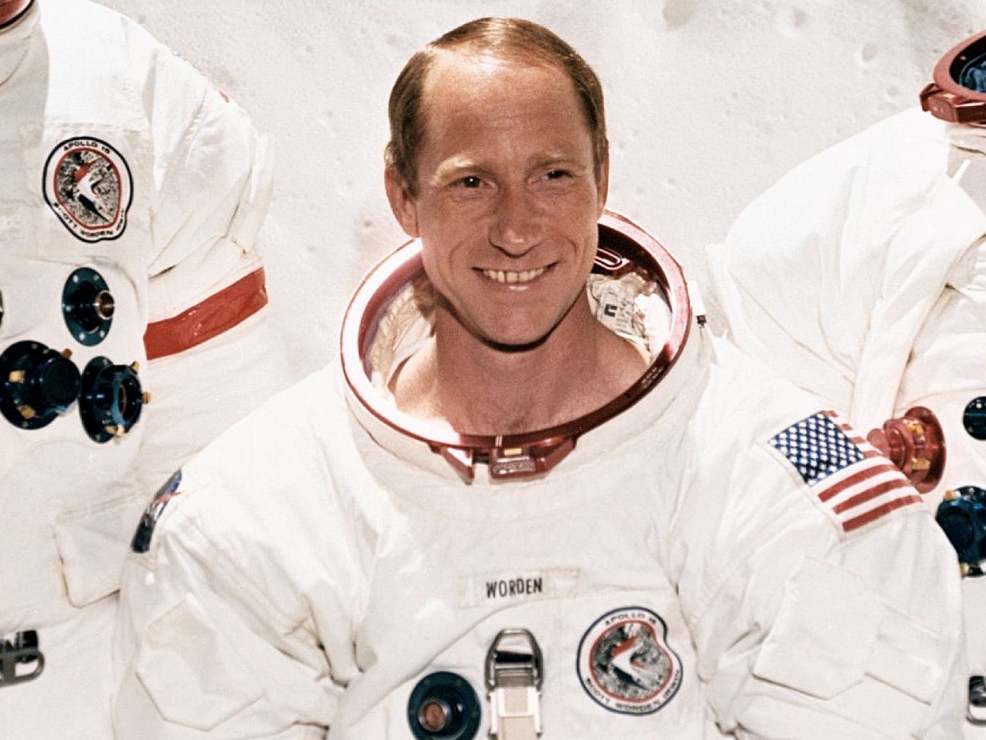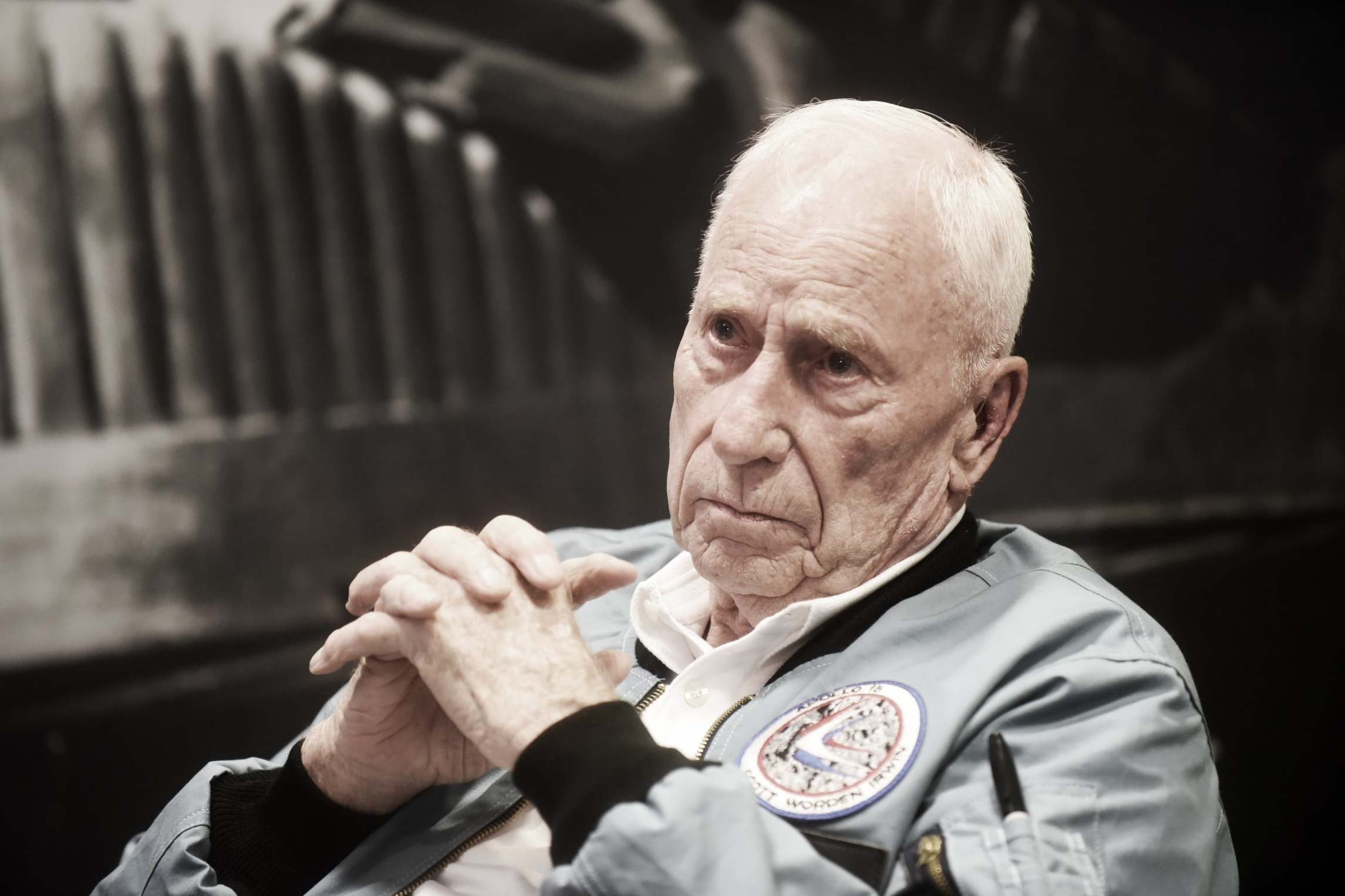Alfred Worden: Astronaut and first man to walk in deep space
He was one of only 24 people to journey to the moon and later made forays into poetry and politics

Your support helps us to tell the story
From reproductive rights to climate change to Big Tech, The Independent is on the ground when the story is developing. Whether it's investigating the financials of Elon Musk's pro-Trump PAC or producing our latest documentary, 'The A Word', which shines a light on the American women fighting for reproductive rights, we know how important it is to parse out the facts from the messaging.
At such a critical moment in US history, we need reporters on the ground. Your donation allows us to keep sending journalists to speak to both sides of the story.
The Independent is trusted by Americans across the entire political spectrum. And unlike many other quality news outlets, we choose not to lock Americans out of our reporting and analysis with paywalls. We believe quality journalism should be available to everyone, paid for by those who can afford it.
Your support makes all the difference.Alfred Worden orbited the moon for three solitary days in the summer of 1971, piloting the Apollo 15 command module and taking detailed pictures of the lunar surface as his fellow astronauts drove a rover far below.
Only 24 people have journeyed to the moon and few spent as much time in quiet contemplation of its surface and the universe beyond as Worden, who has died aged 88. He was an Air Force officer who later ran for Congress, worked for aerospace companies and reflected on space travel in a children’s book and poetry collection.
A farm boy from Michigan, he graduated from Army West Point and became a jet pilot and flight instructor, training some of the men who would later join him as astronauts. While returning to Earth with Apollo 15, the fourth lunar landing mission, he became the first person to conduct a spacewalk in deep space, venturing outside for nearly 40 minutes at a distance of 196,000 miles from Earth.
“Now I know why I’m here,” Worden later said of his mission. “Not for a closer look at the moon, but to look back at our home, the Earth.”
Worden was joined for Apollo 15 by David Scott, spacecraft commander, and James Irwin, who piloted the lunar module. In a mission that marked a new focus on science for the Apollo program, his colleagues spent 67 hours on the lunar surface, collecting rocks and soil samples and using a four-wheeled “moon buggy” for the first time.
Worden remained aboard the command module, Endeavour, overseeing a suite of cameras and scientific instruments as he circled the moon in a cramped spacecraft he likened to a Volkswagen car. During his downtime, he simply looked out the window, awaiting the next “Earth rise” as he came around the moon’s far side.
After his colleagues returned to the command module, Worden embarked on his planned spacewalk, a kind of deep-space ballet in which he removed two 80lb film cassettes from outside the spacecraft.
“You’re sort of floating out there in a vast nothingness,” Worden told Smithsonian magazine, “and the only thing you can see and touch and grab a hold of is the spacecraft … I had trained so well that it didn’t take me any time to do what I had to do, and everything worked out OK, and when I was all done, I thought, ‘Gee, I wish I had found something so that I could have been out there a little longer’.”
Worden and his fellow astronauts splashed down in the Pacific Ocean and were greeted as national heroes, meeting with Richard Nixon in the White House and delivering an address before Congress. But the astronauts never returned to space and were effectively forced out of the Apollo programme after a controversy over a set of mementos – stamped envelopes – that they brought aboard Apollo 15.

Some of the envelopes were sold after the flight, and the astronauts were slated to receive $21,000 (£18,800) of the proceeds. Previous astronauts had arranged similar deals, Worden said, but he and his colleagues turned down the money amid an uproar over the sales. Worden said the money was intended to help fund his children’s education.
The second of six children, Alfred Merrill Worden was born in Jackson, Michigan, in 1932. His family worked on a farm outside his town, although his father preferred tinkering with electronics and was a projectionist at the local movie theatre.
Worden said he “ran the farm” from the age of 12 but decided his life should explore other avenues. He secured an appointment to the US Military Academy at West Point, New York. He graduated in 1955 and joined the Air Force.
He later studied as a test pilot in England and in 1963 received a pair of master’s degrees in aeronautics and engineering from the University of Michigan, experiences that he credited with helping him land a spot in Nasa’s 1966 astronaut class.
Worden was a member of the support crew for Apollo 9 and served as the command module backup pilot for Apollo 12. After Apollo 15, he held senior science positions at Nasa’s Ames Research Centre in Mountain View, California, before retiring in 1975.
In 1974 Worden published his children’s book, I Want to Know about a Flight to the Moon. He also wrote poetry, and published a collection, Hello Earth: Greetings from Endeavour.
“The poems are about as good as you might expect from a pilot,” Worden wrote in his memoir Falling to Earth (2011). “I hope I did a better job than a poet would if asked to fly a jet with no training. And on those long nights when I couldn’t sleep, the writing helped me. It was my own personal, emotional debriefing.”
In 1982, he ran in Florida for the US House of Representatives, losing to Thomas Lewis in the Republican primary.
His marriages to Pamela Vander Beek and Sandra Wilder ended in divorce. In 1982, he married Jill Hotchkiss, who died in 2014. He is survived by two daughters and a stepdaughter.
Alfred Worden, astronaut, born 7 February 1932, died 18 March 2020
© Washington Post
Join our commenting forum
Join thought-provoking conversations, follow other Independent readers and see their replies
Comments